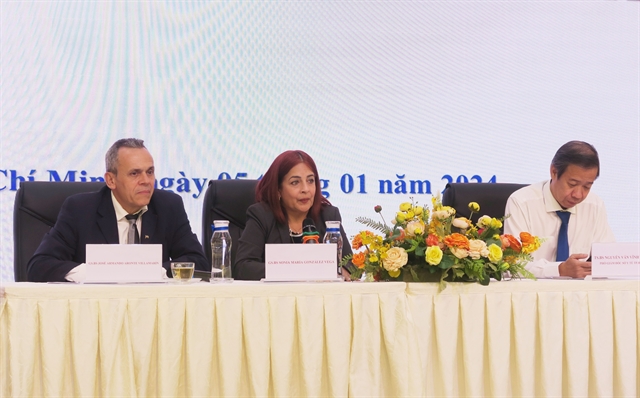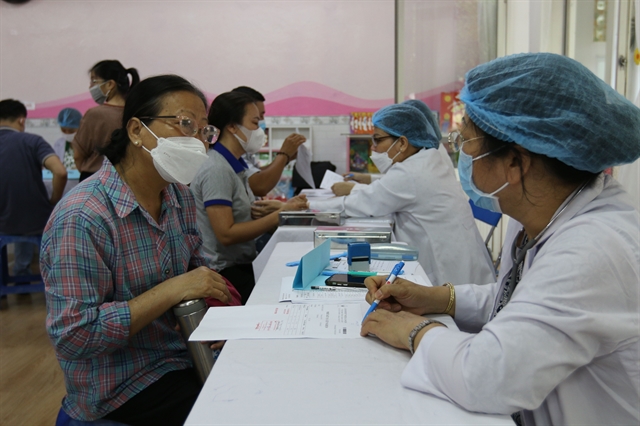 Society
Society


|
| Prof. Dr. José Armando Aronte Villamarín, and Prof. Dr. Sonia María González Vega speaking at the seminar. — VNA/VNS Photo |
HCM CITY — The health department of HCM City is looking to explore the possibility of implementing Cuba's family doctor model to address the medical needs of the country's most populous urban centre.
A seminar was held last week to mark the conclusion of a working programme in the city on the development of the family doctor model, grassroots healthcare, and community health.
Two doctors from Cuba, Prof. Dr. José Armando Aronte Villamarín and Prof. Dr. Sonia María González Vega, who are leading experts in the field of community health, previously shared their experiences with numerous countries. The seminar also brought together doctors, public health experts, and leaders from several southern health departments, along with the leadership of the two largest medical universities in HCM City, the University of Medicine and Pharmacy and the Phạm Ngọc Thạch University of Medicine.
Dr Villamarín lectured about the success of the Cuban healthcare system, which was initiated by its leader Fidel Castro in 1984.
By 2022, Cuba had 94,066 doctors, achieving a ratio of 84.9 doctors per 10,000 people, covering 100 per cent of rural areas - a rate considered among the highest globally.
Notably, over 50 per cent of doctors are family doctors. With a completely free healthcare system and a large healthcare workforce, the average life expectancy in Cuba is 77.7 years.
The country can produce its own medicines and vaccines, and has sent 23,000 doctors to 55 countries worldwide to support healthcare. Cuba is also the first country certified for the elimination of mother-to-child transmission of HIV/AIDS and congenital syphilis.
Concerning the structure of the healthcare system in Cuba, each locality hosts a multi-specialty clinic comprising epidemiologists, specialist doctors, general practitioners, nurses, collaborators, and more. Beneath each multi-specialty clinic, there are approximately 20-30 family doctor offices. Each family doctor office holds responsibility for managing the health of around 1,000 people.
Assoc Prof., Dr. Đỗ Văn Dũng from the HCM City University of Medicine and Pharmacy posed the question of how to attract medical personnel to join the family doctor team and ensure the quality of family doctors.
Vega explained that in Cuba, doctors were initially trained in their specialties, and subsequent adjustments were made to the training system for family doctors. For the rapid and successful development of the family doctor model, the most critical factor is training. Currently, Cuba has 13 medical science universities, 25 medical science departments, and 24 chemistry and medical science departments.
After graduation, doctors will be assigned to clinics and undergo a three-year comprehensive training in various departments such as pediatrics, obstetrics and gynecology, internal medicine, and ICU, while working. Alongside this is the policy of attracting personnel, under which doctors receive equal salaries regardless of being family doctors, general practitioners, or specialists, with differences only in academic titles. Doctors working in family clinics are provided with housing in residential areas. They reside with their families on the upper floor, while the lower floor is used for medical examinations and treatments.

|
| Doctors diagnosing patients in Hồ Chí Minh City. The city's most significant current challenge is the scarcity of healthcare personnel at the grassroots level. — VNA/VNS Photo Thanh Vũ |
More doctors needed
After examining the grassroots healthcare models in HCM City, Villamarín acknowledges that the city's most significant current challenge is the scarcity of healthcare personnel at the grassroots level. Another difficulty lies in persuading and attracting private clinics to participate in the family medicine network. Additionally, there is a need for a change in perception regarding the "family doctor" model.
"A family doctor is not someone who can treat all illnesses. On the contrary, a family doctor must truly be a health consultant, caring for common illnesses and connecting directly with specialist doctors at hospitals when necessary," shared Villamarín.
Agreeing with the assessment of the Cuban expert, Tăng Chí Thượng, Director of the HCM City Department of Health, stated that the city's health sector has anticipated the challenges in implementing the transition to the family medicine model. They expressed a desire for top Cuban healthcare experts to provide advice and technical support during the upcoming period of transition.
In the immediate future, the HCMC Department of Health seeks Cuba's support for short-term training, consultation, and experience-sharing in developing and implementing the Cuban family doctor model. However, to achieve optimal effectiveness, Thượng believes there must be innovations and adjustments tailored to the actual situation of the city's healthcare system.
In 2024, the HCM City Department of Health plans to propose to the HCM City People's Committee the addition of the "Piloting the Implementation of the Cuban Family Doctor Model" initiative in selected districts and wards of the city.
They plan to implement this model in outlying wards and communes of the city within the next two years, with a focus on districts such as Bình Chánh, Củ Chi, Nhà Bè, or Hóc Môn.
"After visiting the hospitals, I see that HCM City has developed excellent infrastructure and a well-trained healthcare workforce, along with excellent medical universities and technology. In Cuba in the past, having conditions like the current infrastructure and healthcare workforce in HCM City was a big dream," said Vega.
"If we had similar conditions in the past, there would be no need to wait for 40 years; Cuba could have implemented the family doctor healthcare system in just a few years. Additionally, with the current infrastructure and technology and the determination from leadership to select an accurate pilot model, and implement appropriate policies for development, I believe that it is possible to build a successful family doctor model, comparable to neighbouring countries," added the Cuban expert. — VNS




